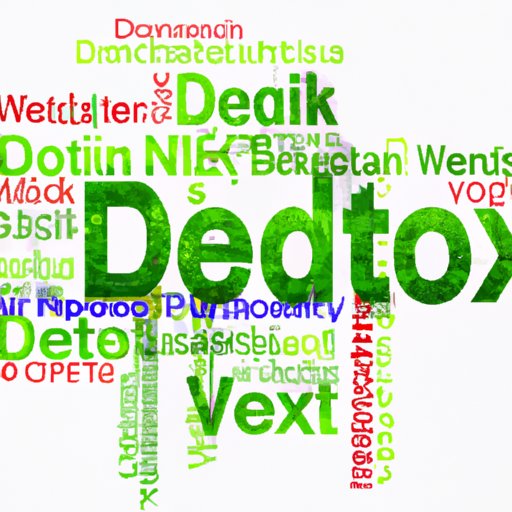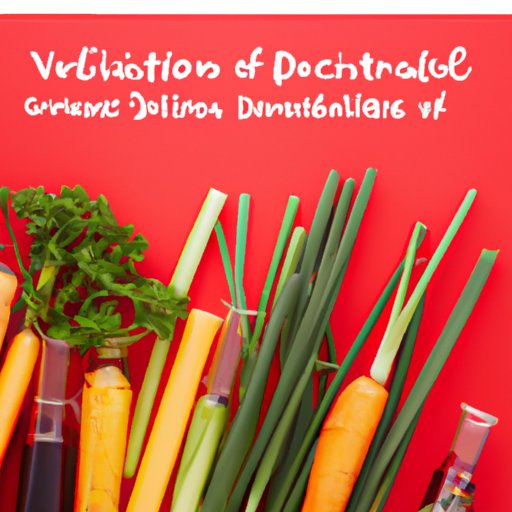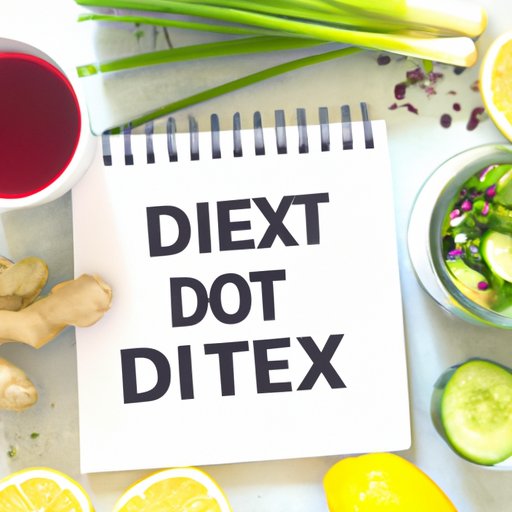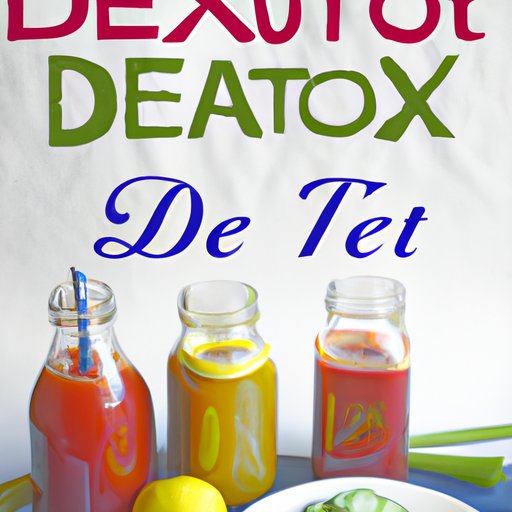Introduction
A detox diet is a way to cleanse the body of toxins and reset the system. It involves eating certain foods that are believed to help rid the body of harmful toxins while also boosting energy levels and improving overall health. Detox diets can vary in length, but they typically last anywhere from one day to two weeks. During a detox diet, you may experience a variety of symptoms, including headaches, fatigue, upset stomach, and cravings.

Definition of a Detox Diet
A detox diet is a type of diet that focuses on eliminating or reducing the amount of toxins in the body. During a detox diet, a person typically eliminates processed foods, sugar, caffeine, alcohol, and other substances that could potentially be harmful to the body. Instead, the diet focuses on consuming whole, unprocessed foods that are rich in vitamins, minerals, antioxidants, and other nutrients that can help support the body’s natural detoxification processes.
Benefits of Detox Diets
Detox diets can provide a number of benefits, including:
- Improved digestion
- Weight loss
- Increased energy levels
- Reduced inflammation
- Clearer skin
- Improved sleep

Overview of Different Types of Detox Diets
There are a variety of different types of detox diets, each with its own set of rules and guidelines. Some of the most popular types of detox diets include:
Juice Cleanses
A juice cleanse is a type of detox diet that involves consuming only freshly-made fruit and vegetable juices for a period of several days. Juice cleanses are thought to help reduce inflammation and flush out toxins from the body. However, it is important to note that juice cleanses can be low in calories and may not provide enough nutrients to sustain a healthy lifestyle.
Master Cleanse
The Master Cleanse is a popular detox diet that involves drinking a lemonade-like beverage made from water, lemon juice, maple syrup, and cayenne pepper for 10 days. Proponents of the Master Cleanse claim that it can help to flush out toxins from the body and promote weight loss. However, there is no scientific evidence to support these claims.
Raw Food Detox
A raw food detox is a type of detox diet that involves eating only raw fruits, vegetables, nuts, seeds, and sprouted grains for a period of several days. Raw food detoxes are thought to help reduce inflammation and improve digestion. However, it is important to note that raw food detoxes can be low in calories and may not provide enough nutrients to sustain a healthy lifestyle.
Other Types of Detox Diets
In addition to the above, there are other types of detox diets, such as herbal detoxes, water fasts, and soup cleanses. Each of these detox diets has its own set of rules and guidelines, so it is important to research each one before attempting it.
How to Prepare for a Detox Diet
Before beginning a detox diet, it is important to take the time to properly prepare. Here are some steps to take before starting a detox diet:
Consult with a doctor or nutritionist
It is always a good idea to consult with a doctor or nutritionist before beginning any type of diet, especially a detox diet. A doctor or nutritionist can help determine if a detox diet is right for you and provide guidance on how to safely follow the diet.
Eliminate unhealthy foods and drinks
It is important to begin eliminating unhealthy foods and drinks from your diet before starting a detox diet. This includes processed foods, sugar, caffeine, alcohol, and other substances that could potentially be harmful to the body. Eliminating these substances in advance can help make the transition to a detox diet easier.
Stock up on detox-friendly foods
Once you have eliminated unhealthy foods and drinks from your diet, it is time to stock up on detox-friendly foods. Depending on the type of detox diet, this could include fresh fruits and vegetables, nuts and seeds, legumes, and whole grains. Make sure to stock up on enough food to last for the duration of the detox diet.

What to Eat and Avoid on a Detox Diet
When following a detox diet, it is important to pay attention to what you are eating. Here are some general guidelines for what to eat and avoid on a detox diet:
Foods to Include
- Fresh fruits and vegetables
- Nuts and seeds
- Legumes
- Whole grains
- Herbal teas
- Water
Foods to Avoid
- Processed foods
- Sugar
- Caffeine
- Alcohol
- Dairy products
- Red meat
Steps to Take After Completing a Detox Diet
Once you have completed a detox diet, it is important to take the proper steps to ensure that you maintain the benefits of the detox diet. Here are some steps to take after completing a detox diet:
Gradually reintroduce other foods
Once you have completed a detox diet, it is important to gradually reintroduce other foods back into your diet. Start by reintroducing healthy, nutrient-dense foods and then slowly add in other foods over time. This will help prevent any adverse reactions and ensure that your body is able to adjust to the new diet.
Monitor changes in health
When transitioning to a new diet, it is important to monitor any changes in your health. Pay attention to any changes in energy levels, digestion, or mood, and talk to your doctor or nutritionist if you experience any negative effects.
Maintain healthy habits
It is important to maintain healthy habits even after completing a detox diet. This means eating a balanced diet, exercising regularly, getting enough sleep, and managing stress levels. Maintaining healthy habits can help ensure that you continue to reap the benefits of your detox diet.
Conclusion
Detox diets are a great way to reset your system and eliminate toxins from your body. By understanding the different types of detox diets, what to eat and avoid, and how to prepare for a successful detox, you can ensure that you get the most out of your detox diet experience.
(Note: Is this article not meeting your expectations? Do you have knowledge or insights to share? Unlock new opportunities and expand your reach by joining our authors team. Click Registration to join us and share your expertise with our readers.)
